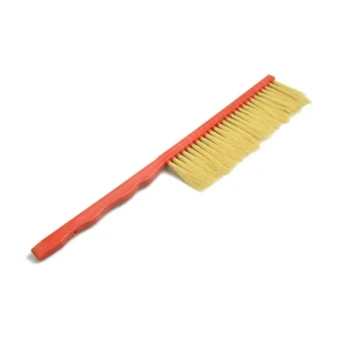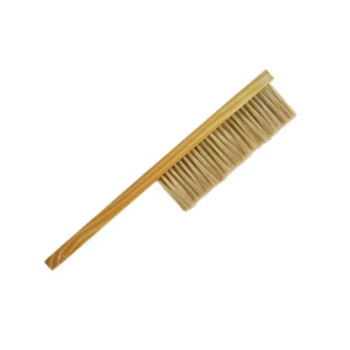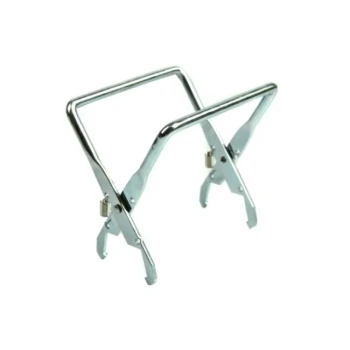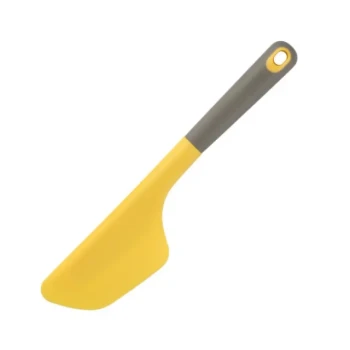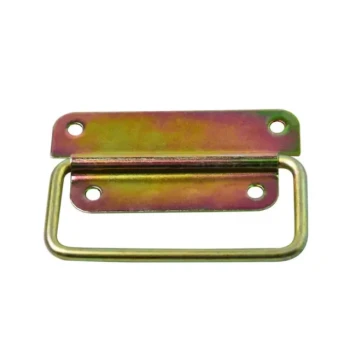The choice between beeswax and plastic foundation hinges on a trade-off between operational efficiency and natural beekeeping philosophy. Key factors include the durability and reusability of the material, the time you have available for hive management, your long-term budget, and how readily your bees will accept it.
Your decision is less about what the bees prefer—they will ultimately build on either—and more about what kind of beekeeper you want to be. The choice between plastic and beeswax is a choice between rugged convenience and natural tradition.
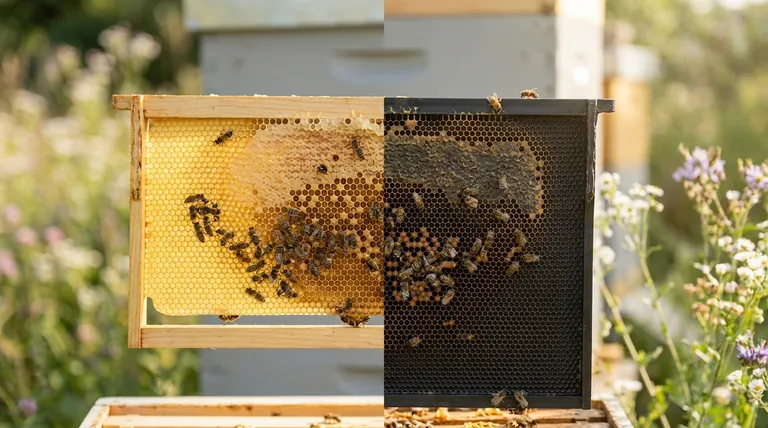
The Case for Plastic Foundation: Durability and Efficiency
Plastic foundation is engineered for strength, longevity, and ease of use, making it a highly practical choice, especially for beekeepers managing multiple hives.
Unmatched Durability
Plastic is incredibly resilient. It resists damage from common pests like wax moths and mice and will not sag or warp in high temperatures.
This robustness means plastic foundation can be cleaned and reused for many seasons, offering significant long-term value.
Time-Saving Installation
Many beekeepers opt for all-in-one plastic frames, which are ready to be placed directly into the hive. This eliminates the often tedious process of assembling wooden frames and manually installing foundation.
Strength During Extraction
The rigidity of plastic foundation provides crucial support during honey extraction. It is far less likely to break or "blow out" in a centrifugal extractor, preserving the drawn comb for the bees to reuse immediately.
The Critical Wax Coating
Bees are much more likely to draw comb on plastic foundation if it comes with a substantial coating of beeswax. While most commercial plastic foundations are pre-coated, many experienced beekeepers apply an extra layer of melted beeswax to encourage faster acceptance and comb building.
The Case for Beeswax Foundation: Natural and Instinctive
Beeswax foundation is the traditional choice, appealing to those who prioritize a more natural approach to beekeeping and want to minimize artificial materials within the hive.
Aligning with Natural Philosophy
For many, the primary benefit of beeswax is simple: it is not plastic. Using beeswax foundation keeps the internal environment of the hive as natural as possible, which is a core tenet of many beekeeping philosophies.
Instinctive Bee Acceptance
Bees don't need any encouragement to work with beeswax. They instinctively and readily draw out comb on pure beeswax foundation, often more quickly than they will on even well-coated plastic.
Understanding the Trade-offs
Neither option is universally superior; they simply serve different priorities. Understanding the direct comparisons will clarify which is right for your specific apiary.
Cost vs. Long-Term Value
Beeswax foundation often has a lower upfront cost per sheet. However, because plastic foundation is highly durable and reusable for years, it can be the more cost-effective option over the long term.
Time Investment
Plastic foundation, particularly in pre-assembled or all-in-one frames, offers significant time savings. This is a major consideration for beekeepers with a large number of hives who need to work efficiently.
Handling and Fragility
Beeswax foundation is more fragile than plastic. It requires more careful handling, can be damaged by pests during storage, and may warp or melt if stored in hot conditions.
Making the Right Choice for Your Apiary
Your decision should be guided by your personal goals, the scale of your operation, and your beekeeping philosophy.
- If your primary focus is efficiency and scalability: Coated plastic foundation offers unparalleled durability, reusability, and speed of installation.
- If your primary focus is natural beekeeping: Beeswax foundation is the definitive choice to maintain a plastic-free hive environment.
- If your primary focus is long-term cost savings: The reusability of plastic foundation often makes it the more economical choice over several seasons.
- If your primary focus is the fastest possible comb building: Bees readily accept pure beeswax, making it a reliable way to get comb drawn quickly.
Ultimately, selecting the right foundation is about choosing the tool that best supports your individual beekeeping journey.
Summary Table:
| Factor | Beeswax Foundation | Plastic Foundation |
|---|---|---|
| Durability & Reusability | Fragile; prone to damage | Highly durable; reusable for many seasons |
| Bee Acceptance | Excellent; bees work on it instinctively | Good, but requires a substantial wax coating |
| Upfront Cost | Generally lower | Generally higher |
| Long-Term Value | Lower; may need frequent replacement | Higher due to reusability |
| Installation & Handling | More time-consuming; careful handling required | Fast, especially with pre-assembled frames |
| Beekeeping Philosophy | Ideal for a natural, plastic-free hive | Ideal for efficient, scalable operations |
Ready to equip your apiary with the right foundation?
As a trusted wholesale supplier to commercial apiaries and distributors, HONESTBEE provides high-quality, wax-coated plastic foundations for durability and efficiency, as well as pure beeswax foundations for natural beekeeping practices. Our experts can help you choose the best supplies to scale your operation and maximize your beekeeping success.
Contact HONESTBEE today for wholesale pricing and expert advice tailored to your commercial needs.
Visual Guide
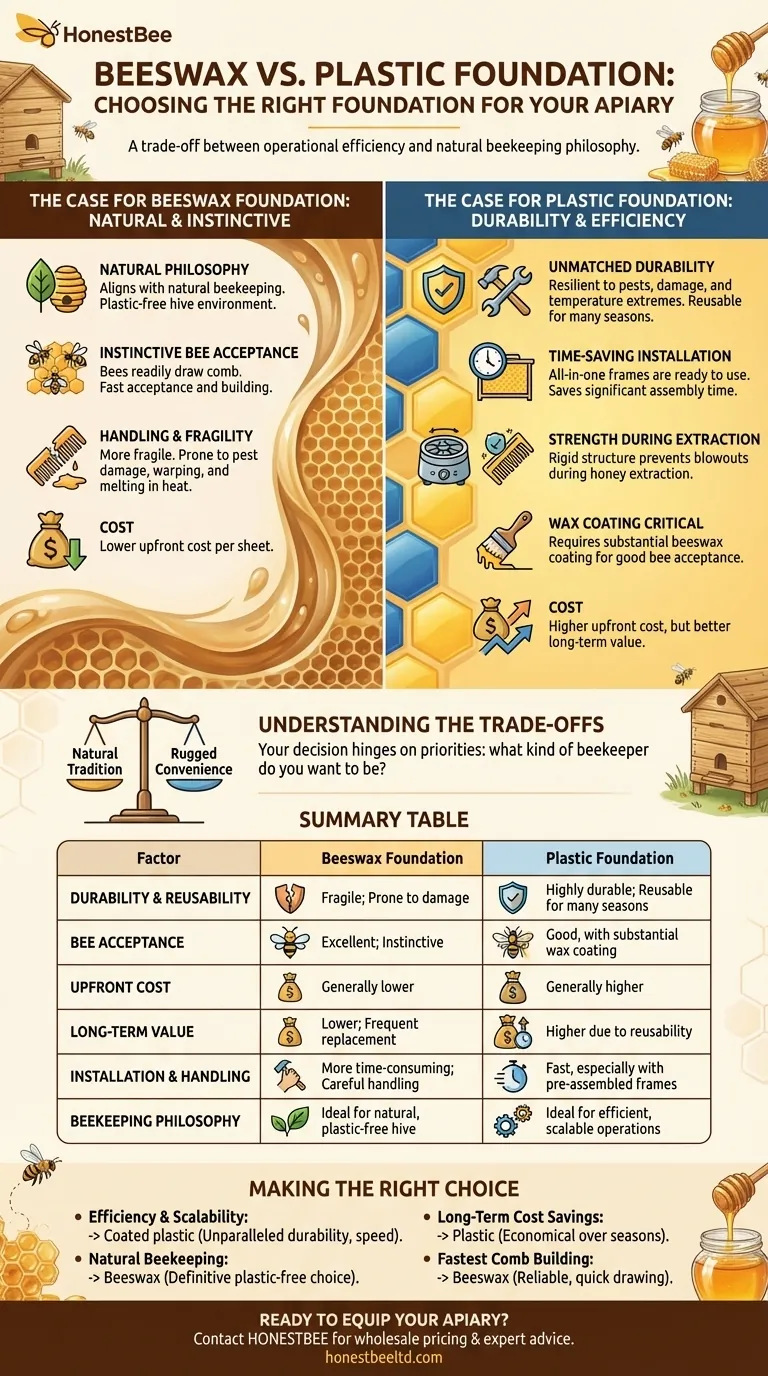
Related Products
- Food Grade Plastic bee Foundation for Bee Frames
- Notebook Style Beeswax Foundation Mould Wax Foundation Mold
- Manual Beeswax Comb Foundation Machine Wax Foundation Mill Embossing Machine
- Beeswax Foundation Sheets Beehive Foundation for Wholesale
- Professional Frame Preparation: The HONESTBEE Electric Wire Embedder
People Also Ask
- What is the primary purpose of adding plastic sheets to a beehive? Optimize Thermal Insulation & Colony Survival
- What colors are plastic frames available in, and what is the advantage of black frames? Optimize Hive Inspections for Brood and Honey
- Can bees produce natural wax comb with plastic honey frames? Achieving the Perfect Balance in Your Hive
- How do you get bees to draw out plastic foundation? Master the Art of Comb Building
- Does plastic foundation affect honey quality or taste? A Practical Guide for Beekeepers
- Why are preassembled plastic frames and foundation competitive in colony reconstruction? Boost Commercial Efficiency
- Why is it beneficial to coat plastic foundation with beeswax? Boost Hive Acceptance & Comb Building
- How is beeswax used to rewax plastic beehive foundation? Boost Colony Acceptance and Hive Efficiency







